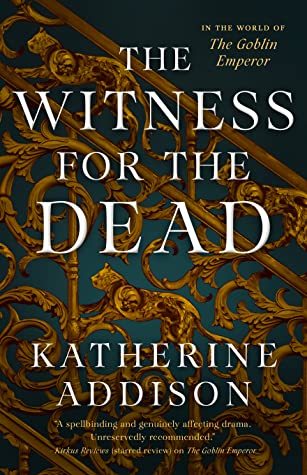A Wonderful Read, But a Poor Standalone: The Witness For the Dead by Katherine Addison
 images by Svetlana Alyuk on 123RF.com
images by Svetlana Alyuk on 123RF.com
I received this book for free from the publisher via NetGalley in exchange for an honest review. This does not affect my opinion of the book or the content of my review.
The Witness for the Dead (The Goblin Emperor, #2) by Katherine AddisonRepresentation: Queer MC (unclear if gay or bi), past M/M or mlm
on 22nd June 2021
Genres: Queer Protagonists, Secondary World Fantasy
ISBN: 0765387425
Goodreads

{ "@context":"https://schema.org", "@type":"Review", "datePublished": "2021-05-06T19:38:25+00:00", "description": "If you go into this book, don't go in expecting a sequel to The Goblin Emperor.", "publisher": { "@type": "Organization", "name": "Every Book a Doorway" }, "url": "https:\/\/everybookadoorway.com\/a-wonderful-read-but-a-poor-standalone-the-witness-for-the-dead-by-katherine-addison\/", "itemReviewed": { "@type": "Book", "name": "The Witness for the Dead (The Goblin Emperor, #2)", "author": { "@type": "Person", "name": "Katherine Addison", "sameAs": "" }, "isbn": "0765387425" }, "author": { "@type": "Person", "name": "Siavahda", "sameAs": "https:\/\/everybookadoorway.com\/" }, "reviewRating": { "@type": "Rating", "ratingValue": 4, "bestRating": "5" }} Highlights
Katherine Addison returns at last to the world of The Goblin Emperor with this stand-alone sequel.
When the young half-goblin emperor Maia sought to learn who had killed his father and half-brothers, he turned to an obscure resident of his Court, a Prelate of Ulis and a Witness for the Dead. Thara Celehar found the truth, though it did him no good to discover it.
Now Celehar lives in the city of Amalo, far from the Court though not exactly in exile. He has not escaped from politics, but his position gives him the ability to serve the common people of the city, which is his preference. He lives modestly, but his decency and fundamental honesty will not permit him to live quietly.
~gravestones are IMPORTANT
~so much opera
~even more tea
~ghosts
~a very unsuitable yellow coat
The first, absolutely most important thing you need to know about this book is: it is not The Goblin Emperor. I think a lot of people are going to be disappointed by Witness just because they’re going to open it up expecting – or at least hoping for – an experience like the one they had with Emperor.
And they’re not going to get one.
If you decide to pick up Witness For the Dead, pretend that you’ve never read Goblin Emperor. Pretend you’ve never even heard of it. The more you separate the two books in your mind – the more clearly you see Witness for what it is, and not what you want it to be – the higher your chances are of enjoying the book.
Do not go into Witness expecting that warm optimistic glow Emperor left you with. Do not expect court politics and princes and treason and an imperial marriage. Do not expect a main character much like Maia, whose lack of education about the court and whose determination to be good made us all fall in love with him.
Pretend you’ve never even heard of The Goblin Emperor.
So: Witness for the Dead is, in essence, a murder-mystery. (It is also written in first-person and has no chapters, only scene breaks. Even structurally it’s vastly different from Emperor.) Celehar, a minor but important character from Emperor, has the ability to ‘ask’ the dead very basic questions – and get answers – if he can touch a corpse that isn’t too old. This makes him ideal, obviously, for investigating suspicious deaths, and also for a number of other more mundane tasks, like determining which of the conflicting versions of a person’s will is the real one. Pretty much immediately as the book opens, he is tasked with both: investigating the death of an opera singer, which his powers confirm was definitely a murder, and sorting out a confusion of wills for a respectable, fairly well-off family. Over the course of the novel, he also undergoes religious trials, pilgrimages, visits the opera, officiates funerals, looks into another, older death to try and figure out if something’s not right about it, and ‘puts down’ ghouls, a kind of monster that come about if graves aren’t taken care of properly.
I have a hard time figuring out whether or not I actually liked it. The ending especially soured my feelings, because I despise Agatha Christie-esque ‘solutions’ to mysteries; ie, when there’s no way the reader could put the answer together, even in hindsight, because the author prefers a ‘le gasp!’ reveal at the second-last moment to working clues into the narrative. And I don’t feel like it’s much of a spoiler to let you know that’s how one of the major plotlines gets wrapped up, because I’m not telling you which one – and it’s something I would want to know, if I was going into a story that is, for the most part, a murder-mystery.
However I felt about the ending, though, I really enjoyed the reading experience. I finished my ARC in about 24 hours, which is rare for me these days, but I just couldn’t put it down. Addison’s writing is beautiful, and I loved the attention to detail that went into the worldbuilding, from street names to terms of address. Celehar himself is a very sympathetic character; I would like to offer him a hug, if the impropriety of it wouldn’t horrify him. He’s an intrinsically honest and straightforward person who is deeply dedicated to his duties – and not just his duties, but what he sees as his duties, which include many things not officially demanded of him, but which he is capable of and which will help people. He carries around a lot of guilt for past ‘indiscretions’, and will work himself to the bone to give comfort or take care of others.
Every other character, as well, no matter how minor, felt impressively fleshed-out. Addison has created an interesting cast – not too big to juggle, but enough to give the reader a bit of an idea of just how diverse Celehar’s city is, and enough that they all get enough page time to feel like real and complete people. It’s really impressive from a writing perspective, and a treat from a readerly one!
Basically, I have nothing but praise for most aspects of this book. But once I take a step back, I find myself hugely unsatisfied with it as a standalone. It reads like the start of a series, maybe, but if that’s supposed to be it – and I think it has been stated that this is supposed to be a standalone – then it’s just… I’m not sure I’ve ever said this before, but if Witness is all we get, then I don’t know what the point of it was. I know it should be enough that it was a fun read, ending notwithstanding…but it doesn’t feel like enough, this time. I like standalones. But this doesn’t feel like a standalone. This feels like a slice-of-life, not a self-contained story; like we saw a few weeks or months of Celehar’s life at random. Does that make sense? In that sense, it doesn’t really feel like a story. It’s just… A bit of Celehar’s life. It doesn’t really build to anything, and closing the final page doesn’t leave me with the vague but happy sense that I know how the characters will get on now the story is done.
Maybe this is very normal of mystery novels, and I’m unhappy because I’m not familiar with what’s actually a perfectly normal structure for a mystery novel – I don’t read mysteries, I don’t know if this is how it’s supposed to go. The closest thing I can think of is that certain sub-section of urban fantasy where you have some kind of detective-y character solving cases, stories which tend to be quite action-heavy, and where each book in the series has its own internal plot that may or may not interlock with the next book. I’m not usually a fan of those, and Witness didn’t feel even like one of them, to me. I’m not sure why, because Celehar is detective-ing too, isn’t he? Maybe it’s just that the tone is so completely different; although Witness moves along briskly, it never feels like being stuck in an action movie. Maybe the more introspective, thoughtful prose undercuts a sense of urgency? Which leaves the ‘cases’ Celehar’s investigating feeling…like this is his everyday-work, rather than something that needs All The Solving RIGHT NOW.
There’s also a few threads which feel like they’re building up to something, but which are cut off by the book’s ending before they can really go anywhere. In particular, Witness seemed to be hinting that one of Celehar’s friendships was going to develop into a romance, but that didn’t happen – which left me feeling like an important thread had just fizzled out instead of becoming something. I don’t care about romantic plotlines, but I don’t like being encouraged to root for one only for it to not happen. That just leaves me confused and frustrated.
Ultimately, my critiques come down to two main points: I think this is a very poor example of a standalone (a critique which obviously becomes null and void if it turns out the plan is to write more Celehar books), and the ending felt very abrupt. Like I said, I was left wondering what was the point? Which is not something I’m used to thinking about books, ever!
On the other hand, I really enjoyed actually reading this book. Addison is a great writer, the cast is wonderful, the worldbuilding flawless. I have to give it four stars for all those reasons, and in gratitude for the hours that disappeared like seconds while I was reading. If you accept Witness for what it is, then there’s no way to call it a bad book.
So basically: if you’re okay with murder-mysteries set in a highly detailed fantasy world? Then absolutely go for it! But if you’re looking for something else, I urge you to look elsewhere. Just because you loved The Goblin Emperor does not mean this is the book for you.
But if you can accept Witness for what it is, then I think you’ll enjoy it.

The post A Wonderful Read, But a Poor Standalone: The Witness For the Dead by Katherine Addison appeared first on Every Book a Doorway.



